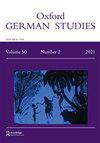The ‘Homecoming’ of the Activists: How the Communist Refugees Returned from British Exile
IF 0.1
3区 文学
0 LITERATURE, GERMAN, DUTCH, SCANDINAVIAN
引用次数: 0
Abstract
This paper considers how many of the Communist refugees — German, Austrian and German-speaking Czechs — who were in exile in Britain during the Second World War, followed the dictates of the Party and returned home after the war to help rebuild their war-torn countries physically, politically, economically and socially. While the British authorities permitted the Czechs, as ‘friendly aliens’, to leave without too much delay, obstacles were put in the way of the German and Austrian refugees who frequently could not leave Britain until late 1946 or thereafter. The paper examines the relations between frustrated refugees and British officialdom as well as the reception the refugees received from their compatriots on their eventual ‘homecoming’. Generally speaking, the returning Communists did not fare well. In Austria, the returnees, many of whom were of course Jewish, were met with continuing antisemitism as well as anti-communism; in Czechoslovakia, as the Cold War set in, some were arrested while others fled once again; and in the GDR, the preferred destination of the returning German Communists, the label of ‘Westemigrant’ could prove a considerable handicap. All in all, despite the initial idealism, the common experience was one of disillusion and disappointment.积极分子的 "回家":共产主义难民如何从英国流放地归来
本文探讨了第二次世界大战期间流亡英国的许多共产党难民--德语、奥地利语和德语捷克人--是如何遵从党的指示,在战后返回家园,帮助战患国家进行物质、政治、经济和社会重建的。英国当局允许作为 "友好外国人 "的捷克人离开英国,没有过多拖延,但对德国和奥地利难民却设置了重重障碍,他们往往要到 1946 年底或之后才能离开英国。本文探讨了受挫难民与英国官方之间的关系,以及难民最终 "回家 "时其同胞对他们的接待情况。总的来说,回国的共产党人并不顺利。在奥地利,回国者(其中许多当然是犹太人)遭遇了持续的反犹太主义和反共主义;在捷克斯洛伐克,随着冷战的爆发,一些人被捕,另一些人则再次逃离;而在回国的德国共产党人首选的目的地--民主德国,"西方移民 "的标签可能会成为一个相当大的障碍。总之,尽管最初抱有理想主义,但共同的经历都是幻灭和失望。
本文章由计算机程序翻译,如有差异,请以英文原文为准。
求助全文
约1分钟内获得全文
求助全文
来源期刊

OXFORD GERMAN STUDIES
LITERATURE, GERMAN, DUTCH, SCANDINAVIAN-
CiteScore
0.10
自引率
50.00%
发文量
2
期刊介绍:
Oxford German Studies is a fully refereed journal, and publishes in English and German, aiming to present contributions from all countries and to represent as wide a range of topics and approaches throughout German studies as can be achieved. The thematic coverage of the journal continues to be based on an inclusive conception of German studies, centred on the study of German literature from the Middle Ages to the present, but extending a warm welcome to interdisciplinary and comparative topics, and to contributions from neighbouring areas such as language study and linguistics, history, philosophy, sociology, music, and art history. The editors are literary scholars, but seek advice from specialists in other areas as appropriate.
 求助内容:
求助内容: 应助结果提醒方式:
应助结果提醒方式:


